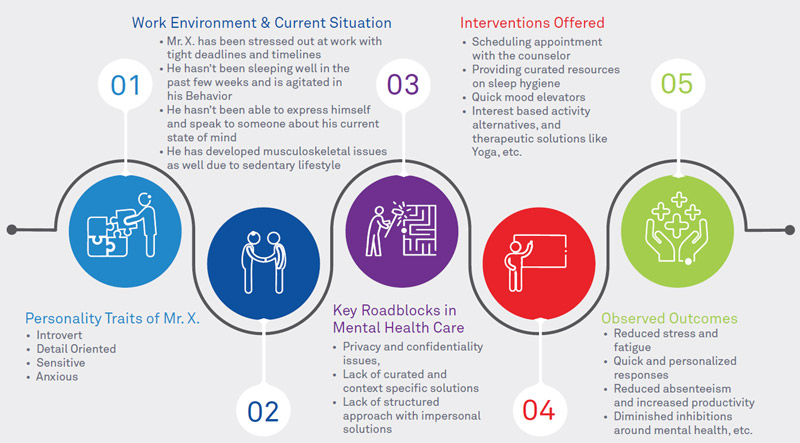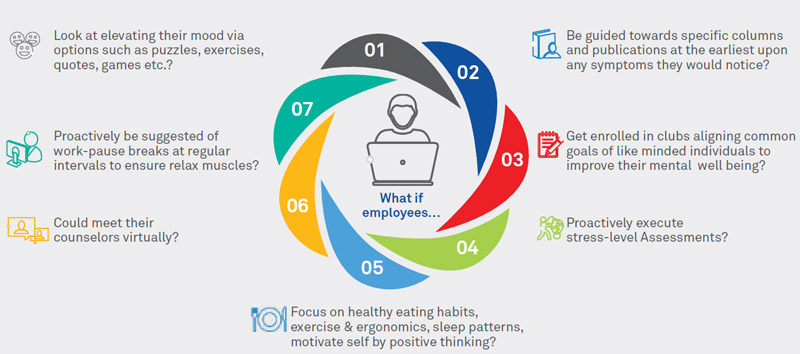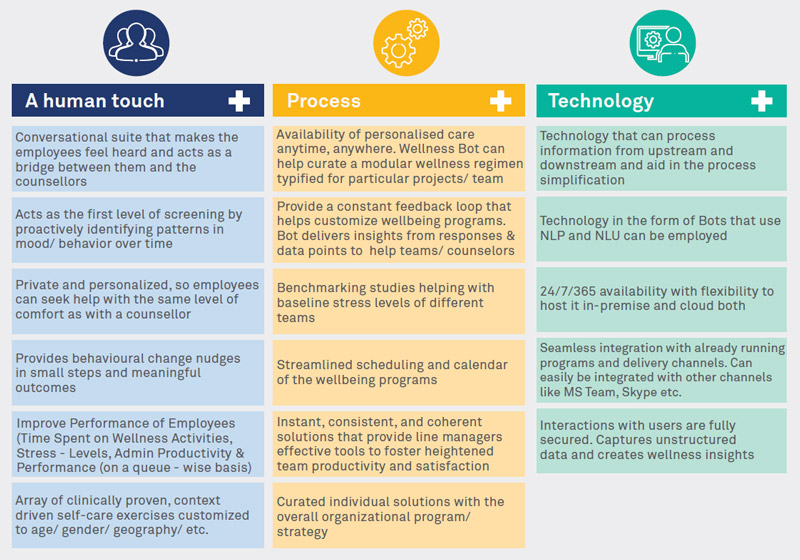Proliferating New Age Digital Technologies to Boost Mental Health and Wellbeing
The resurgence of the COVID-19 pandemic has brought to the fore three areas of wellbeing: physical, mental and social. In the early 1970s, wellness was thought of as a lack of illness, the absence of symptoms of disease indicated that we were well. Today, the World Health Organization (WHO) defines wellness as “a state of composite physical, mental, and social well-being, and not merely as absence of any disease or infirmity.” When we blend wellness with today’s digital technologies such as automation (RPA), artificial intelligence (AI), and augmented reality (AR), the potential results are both extensive and exciting.
Mental wellness, a relatively underplayed concept, has been brought to the fore amid recent emerging statistics in the organizational context:
A significant collection of organizations have realized this burgeoning importance of ensuring mental wellness for their employees, prompted in part by the importance of these statistics:
Understanding mental health with a typical user journey
Now let’s relate the concept of mental health with a typical user journey -- Mr.X., an employee with multiple layered characteristics -- as we attempt to solve his issues by marrying psychology (mental wellness) and technology (digital) in Figure 1, titled “User Journey of MR X.”

Major roadblocks to accessing mental health and wellbeing solutions at the workplace
According to an internal survey conducted by organizations ,some of the top challenges faced by employees like MR X. include:
Using technology to transform the ‘new normal’ by addressing challenges
Can technology solve problems and bring transformation to become the new normal? The answer is probably an emphatic “Yes” because today technology can aim to solve some of the problems that we would face regularly, illustrated with Figure 2, “What-If scenario based modeling”:

How can the power of digital technologies assist further?
The health and wellness industry, already a booming $4.5 trillion business globally has seen a mushrooming of online sessions for improving mental state today that cost anywhere between $30 and $60 per hour, and considering the COVID-19 pandemic we have been a part of, the future holds immense potential as some of the following areas of application begin to emerge:
People, process, and technology coming together: A perfect combo?
In an organizational context, the HR, strategy, or digital department is at the forefront of solving employee and customer challenges. A combination of people (right SMEs), processes (mapping a streamlined workflow), and technology (what solves when and how) is undoubtedly a critical factor for success. Let us look at the various elements that could work in this combo. Figure 3: The Framework

What would the combination of people, process, and technology lead to?
Deploying technology to solve mental challenges could lead to indicative benefits such as:
All of these instances eventually lead to happy and satisfied employees that deliver both on the personal as well as organizational front. Organizations now are able to reduce their overall expenditure on employee health while affecting the overall organization brand and Net promoter/customer/stakeholder score (NPS/CSAT). This can also lead to higher employee morale, greater focus of employees from tactical to strategic tasks, and continuous improvement in growth trajectories.
In summary, especially since COVID-19 became a global crisis earlier this year, the success of organizations largely depends on the mental well-being of employees as they help clients and stakeholders navigate these turbulent times. Employees and employers must continue to have their heart in the right place to ensure growth during and after the COVID-19 era to help themselves and their customers flourish
Mehul D. Damani
Customer Experience evangelist, Enterprise Operations Transformation, Wipro
Mehul is a seasoned digital and transformation thought leader with 13+ years of experience and a proven record of accomplishment in collaborating with clients across business domains such as digital transformation, customer experience enhancement, business strategy, B2B/B2C consulting, and marketing and sales enablement. His industry focus encompasses industry verticals such as Retail, Consumer Goods, Travel-Hospitality, Supply Chain, Manufacturing, Hi-Tech, and Telecom.
Sonal Khaira
Wellness lead, Wipro
Sonal is the wellness lead for mental health and psychological intervention to ensure that wellness programs have strong wellness initiatives in place that can be tracked periodically. With cumulative experience of 9+ years, she believes firmly in the humanistic approach to life, bringing about a change in the way “we work,” and her background in HR and Psychology enables her to understand the intricate details of human psyche.